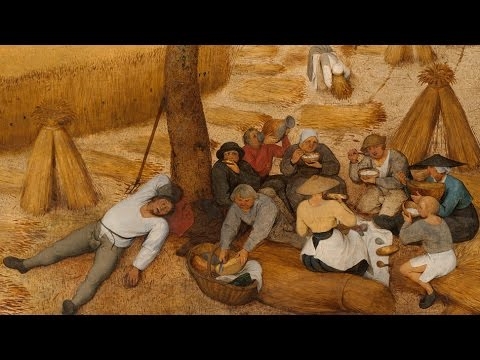: Ancient Rome. The gladiator Spartacus raises the slaves to fight for freedom and against the Roman authorities, but dies, never reaching the cherished goal.
November 10, 78 BC e. the streets of Rome were crowded with people - everyone hurried to the Great Circus. The three-day holiday, organized by the Roman dictator Lucius Cornelius Sulla Happy, began a day ago and now has reached its climax - gladiatorial battles. In a huge amphitheater gathered both commoners and the Roman nobility, led by Sulla. The beautiful matron Valery, who divorced her husband a week ago, was present at the battles.
While the gladiators divided into two groups fought in the arena, Sulla talked with Lucius Sergius Katilina, a very brave patrician with a fiery temper. Nearby sat a beautiful Greek woman, a courtesan of Eutibida. Meanwhile, one of the groups began to win - seven were surrounded by three, among whom was the mighty and handsome gladiator Spartak. He was a Thracian leader and fought against the Romans, then was captured and served in the Roman army for some time. When Rome started the war against Thrace again, Spartacus deserted to fight for his homeland, was again captured and became a gladiator.
Despite the numerical superiority of the enemy in the arena, Spartak did not give up. He attacked the seven gladiators and destroyed them. An enthusiastic audience demanded from Sulla freedom for the brave gladiator, Valery supported the request, and Spartak had to be released. Soon, Sulla got bored with the sight, and he retired, having previously offered Valeria to become his wife.
In the evening, Spartacus celebrated his liberation in the tavern of Venus Libitina. Despite the victory, the gladiator was sad, because only he received freedom, and his friends remained slaves doomed to death. At the height of the holiday, Katilina entered the tavern. He wanted to share with Spartak the money won thanks to his victory. Catilina whispered to the gladiator that she knew about his secret struggle for the liberation of slaves and shared his views. At this time, a beautiful blonde Thracian girl entered the tavern. As a slave procurer, she was forced into prostitution. Spartak recognized in her the long-lost sister of Mircea.
Spartak tried to buy his sister, but the owner asked for a huge amount. Then the gladiator gave the villain Katilina's money on the condition that Mirna would be freed from work for a month and settled in a separate room. For a month, Spartak made close contact with the “rebellious patrician” Katilina. Meanwhile, a gladiator's friend managed to arrange so that the beautiful Valeria, who had already become Sulla's wife, bought Mirna.
Having rescued the sister from the cruel master, Spartak closely engaged in a conspiracy. With his associates, the gladiators Crixus and Artorix, he walked through gladiator schools and taverns, knocking together the backbone of the future army. Not limited to Rome, they made acquaintances in Capua. There they were supported by the German gladiator Enomai, a man of courage, but gullible and unreasonable. Two months after meeting Katilina, Spatrak realized that they were not on their way. If the gladiator wanted to achieve freedom for all slaves and overthrow the power of Rome over the world, then the patrician wanted to change the existing order only in favor of free Romans. He, like everyone else, considered the natives of other countries barbarians, unworthy of freedom. At a reception hosted by Katilina in his honor, Spartak made sure that he and his friends were ready to fight with the Senate only for the rights of free citizens of noble birth. He stated that he was abandoning his plan, after which he changed his password and the signs with which the conspirators recognized each other.
After a triumphant victory in the circus, Spartak attracted the attention of two women - Valeria and Eutibida. The gladiator worshiped the beauty and mind of Valeria. Soon, Mircea informed her brother that her mistress was offering him the place of the lanists, the head of the gladiatorial school that Sulla had organized in his suburban estate. That same evening, Spartak and Valeria became lovers. In the "intoxication of love" the gladiator almost forgot the "holy work of freedom", which he vowed to bring to the end.
At this time, Spartak received an invitation from Eutibida, allegedly related to the conspiracy, which the Greek learned about. Pretending to be like-minded Spartacus, she tried to seduce him. The delights of the red-haired Greek woman left the gladiator indifferent. The cunning Eutibida could not accept the fact that the gladiator rejected her. She instructed her fan, actor Metrobius, to scout about the gladiator's plans, found out about his connection with Valeria and ordered to obtain evidence of this connection.
Meanwhile, Spartacus's plot was nearly uncovered. A spy entered the tavern of Venus Libitina, a freedman of one of Catalina's friends who was present at the reception. He did not believe that the gladiators would so easily abandon their plans, and decided to inform the Senate about them, hoping to get a large sum of money. Fortunately, Crixus spotted the spy on time and ordered him executed.
Eight days later, Metrobius appeared at Eutibida with evidence. Having bribed slave Valeria, he saw how Spartacus left the venerable matron’s bedroom at night. That same evening, Eutibida sent an anonymous denunciation to Sulla, but soon realized that the denunciation would harm not only the hated Valeria, but also her beloved Spartak. A few hours later she sent Metrobius to intercept the messenger.
After spending the night in an obscene orgy, Sulla basked in the hot pool. The day before he found out about a disrespectful statement addressed to him. Now the unfortunate was brought into the baths, and Sulla watched the punishment. A bloody sight, sleepless night and hot water led the dictator to death. He did not have time to read the denunciation of Eutibida.
Sulla's death caused unrest in Rome. The city was divided into its supporters and opponents. At this time, Spartak was offered the position of a fencing teacher in a large gladiatorial school in Kapua, where he could recruit several thousand soldiers for his army. Having made a difficult choice between love and duty, Spartacus went to Capua.
February 15, 73 BC e. Guy Julius Caesar returned to Rome. He invited Metrobius to dinner, but by the evening the comedian had gathered so much that he didn’t get to Caesar’s house, but buried himself in a clearing that Spartak used for secret meetings. Waking up, Metrobius heard voices - it was the gladiators who were discussing their conspiracy. Having got out of the clearing unnoticed, the comedian rushed to Caesar. Deciding to use the plot for his own purposes, Guy Julius went to the tavern of Venus Libitina and warned Spartak about the danger. Caesar managed to understand that the gladiator is a talented commander, and called him on a campaign. He believed that the absolute freedom for which Spartak is fighting is impossible, but the gladiator did not want to surrender and leave his friends.
The next morning, Metrobius informed the senate about the impending rebellion. Immediately after talking with Caesar, Spartak rushed to his school, but did not have time - the messenger ordered the senators to close all the gladiators in the school buildings earlier. To suppress the uprising was entrusted to the military platform Titus Servilian, arrogant young man. Having hardly got past the school fence, Spartak found his soldiers ready for battle, but without weapons. He armed them with burning torches and ordered them to break through to the doors of the weapon rooms. However, the military legions had already approached the school, and the gladiators had to disperse into the rooms. Spartak with hundreds of associates withdrew from the city and became a camp on Mount Vesuvius, collecting all the slaves from the surrounding villas along the way.
Spartacus sent messengers to major cities, and soon groups of gladiators began to flock to the rebel camp. The rebels equipped the camp on the site, surrounded on three sides by gorges and steep cliffs. Soon, Spartacus crushed the legions of Titus Servilian. The prefects of the surrounding cities asked Rome for help, but the senators did not take the slave uprising seriously, and the country at that time waged more serious wars. In the end, they entrusted the suppression of the uprising to an experienced warrior, tribune Claudius Glabr. In the meantime, Spartacus managed to form an army according to the Roman model.
Going to the camp of the gladiators, Glabr realized that the rebels were trapped, and he only had to wait until they ran out of provisions. However, Spartak found a way out. He ordered to weave the longest stairs of willow twigs. Gladiators went down to the bottom of the gorge along them, circled the rock, at night attacked the legions of Glabra and defeated them. Thus began the victorious march of the army of Spartacus.
After 20 days, the legions of rebels, numbering more than 5,000 people, were already in Campania. Spartacus introduced the strictest discipline in his army. Gladiators did not rob civilians, so the cities of Campagna surrendered to them one by one. Two months later, the Senate sent an army against the gladiators led by the praetor Publius Varin. By this time, Spartacus, joined by Crixus, who escaped from Rome with a large detachment, managed to train his legionaries well, and without much loss defeated the praetor army. The advantage of Spartacus was the speed of movement of his army, while the Roman legions acted once and for all established rules and were predictable.
Having won, Spartak moved to Capua, rescued the remaining gladiators and returned for a month to his camp in Campañea. Soon, Mircea came to the camp to look after her brother. Returned and a true friend of Spartacus Artorix. Mircea told her brother that Valeria, who admires him and considers him a great commander, is always sad. Her only consolation is the little daughter of Postumius. At this moment, Spartacus was informed of a young soldier from Rome. To the gladiator's surprise, Eutibida was hiding under military ammunition. Pretending to sympathize with the cause of Spartacus, she gave him all her fortune and asked him to take her to the orderlies. In the meantime, Varinius recruited new troops, but this did not help him - despite the unauthorized actions of the German Enomai, Spartacus defeated the legions of the praetor in a long and bloody battle.
After the battle, the gladiators stopped to rest in the former Roman apartments, where slaves flocked from all over the country. Spartacus created an army that was not inferior to Roman either in discipline or military skill. Spartak gave one of the legions under the command of Artorix, who fell in love with Mircea. The girl who remained with her brother reciprocated, but considered herself unworthy of his love. Spartak, taking advantage of the respite, spent the night at Valeria. This was his last meeting with his daughter and lover. Valeria's old housekeeper, whose two sons went into the gladiator’s army, believed that slaves did not need freedom — without the support of the owners, the slaves would simply starve to death. The old man's words made Spartak doubt for a moment, but after much deliberation, his former confidence returned to him.
In the meantime, Rome was seriously afraid of the formidable gladiatorial army, and handed over the leadership of the army to an experienced commander, patrician Kai Anfidiy Orestes. The commander tried to outwit Spartak by sending “deserters” with false information to him, but the gladiator unraveled this trick. There was a battle that caused great losses to both sides and another victory for the gladiators. Spartak decided not to go to Rome, "where every citizen was a soldier," but to withdraw the army to Puglia and increase it at the expense of fugitive slaves. Soon, an ambassador from the Senate appeared to Spartak. He offered the gladiator a high post in the Roman army or the post of prefect and a quiet life with Valeria and daughter if he dismissed his army or brought soldiers to the slaughterhouse. Spartak refused.
At night, Eutibida tried to seduce the gladiator, but he rejected her. The insulted Greek woman vowed to take revenge. In the morning, Spartak made Eutibidus the order of Enomai. Greek woman quickly conquered the nearby German and inspired him with distrust of Spartak. The gladiator decided to invite Catalina to take command over his army, thereby attracting part of the free-born Romans to his side and turning the rebellion of all despised slaves into a civil war. Having learned from Enomai about these plans, Eutibida ordered the trusted servant to intercept and kill the messenger sent by Spartacus to Catalina.
Another gladiator's messenger, Artorix, got to the patrician, but Catilina refused the offer of Spartacus - the proud Roman was disgusted by the idea of leading the army of dirty slaves. In the house, the patrician Artorix heard Metrobius chatter - he boasted that he had exposed the gladiators' conspiracy. The comedian recognized Artorix and decided to seize him, but the gladiator escaped and the actor died.
Having lost hope of conquering Rome, Spartacus decided to cross the Alps and dissolve the army. He hoped that the former gladiators would return to their countries and raise uprisings there against the Roman yoke. The Senate, meanwhile, sent two consuls against him, Lentulus and Helium, with a huge army. The Military Council approved Spartak’s plan to leave through the Alps, only Enomai was against. Eutibida inspired the German that Spartacus had sold out to the Senate. The Greek woman kept her connection with Enomai in deep secret, and Spartak did not suspect that someone had a bad influence on his friend. One night, the German legions left the camp of Spartacus. The gladiator hardly stopped the Gauls, who also decided to follow the Germans.
Enomai moved to Rome. Spartacus, having defeated the army of Lentulus, hastened to his aid, but did not have time - the German legions were easily defeated by the army of the consul Helium. The gladiator arrived on the battlefield when it was all over, attacked Helium and defeated his legions. For Enomai, this was the last battle. Dying from numerous wounds, he called Eutibides, but she treated him with contempt, and the German realized how much he was mistaken. The Greek woman pretended to be wounded. She was found among the corpses, Spartacus was delighted with the imaginary valor of the girl and enrolled her in Crix's orderlies. Losing no time, Eutibida got into a trust in the kind and naive Mirce. Moving freely around the camp, she found out that some military leaders were unhappy with Spartak’s intention to end the uprising. They wanted to go to Rome. When Spartak began to prepare for the next battle, the free-born Kai Gannik and the Numidian Orzil declared that after the battle they would separate from the main army and move to Rome. After another victory, the gladiator decided to submit to the will of the majority, although he knew that this would lead to the death of the army.
Despite the iron discipline established by Spartak, the army of many thousands began to decompose from the inside. The soldiers, accustomed to constant victories, relaxed, began to think about profit and rob the surrounding villages. Spartak stopped this by executing the most irrepressible looter Orzil.
Meanwhile, the frightened Senate led the troops of the recently elected Praetor Mark Licinius Crassus. The Romans and the rebels tried to deceive each other, making long transitions and ingenious maneuvers. One night, Eutibida came to Crassus and proposed a cunning plan based on betrayal. Using the post of orderly, she undertook to confuse and divide the gladiator's army. As a result of this vile intrigue, Crixus died and a significant part of Spartak's army was destroyed, and the captured gladiators were crucified on crosses along the roads. So Spartak learned about the betrayal of Eutibides.
Wanting to take revenge, Spartacus attacked the army of Cass celebrating the victory, defeated him and ordered the crucified Romans to be crucified. A series of battles threw the gladiatorial army to the city of Temeze, where Spartak strengthened and ordered the construction of a fleet of small boats.
Mircea often visited the temple dedicated to Mars of Lucan. Eutibida, who remained at Crassus, decided to explore the area around the city and came across a temple. Having bribed the priest, she found out that Mircea often came here, and decided to kill her.Taking two soldiers, she set up an ambush near the temple, but at that time a gladiator patrol passed by. They noticed a Greek woman, she ran, fell into her own trap and died.
Meanwhile, the gladiatorial fleet was ready, but Spartak was unlucky - the wind and rough sea did not allow them to sail far. Then the commander built a fortified camp on a small peninsula. Crassus, who came up soon, decided to build a wall with a moat across the isthmus and trap Spartak. One night, when the wall was almost ready, the gladiators filled the ditch with sandbags and left Crassus.
Soon after, the legions of Kai Gannik broke off from the army of Spartak. This gave Crassus the opportunity to further weaken the army of gladiators. However, Crassus could not appropriate the victory laurels - the famous Roman commander Pompey, who recently ended the war, came to his aid. Spartak learned about this from a letter to Valeria, which warned him of the danger and begged to surrender to Crassus, leave the army and hide in her estate. Artorix, meanwhile, managed to find out the secret of Mircea and assured the girl that this was not an obstacle for him. Spartak tried to negotiate with Crassus. He wanted the senate to spare his warriors, but Crassus scornfully refused the gladiator, for whom the last hope of salvation had disappeared. After sending Valeria a farewell letter, Spartak led his army in the last battle and died.
After the battle, Mircea found the body of her brother and the seriously wounded Artorix, who died in her arms. Unable to live without a loved one, the girl committed suicide. The sons of the housekeeper Valeria burned Spartak on a funeral pyre, and the ashes were taken to their mistress.












